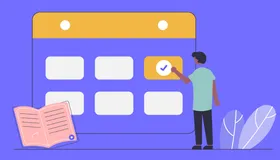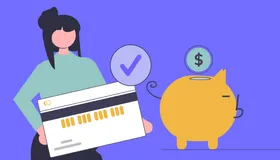What is IELTS and Why Does It Matter for Study Abroad?
It is a standardised exam that helps students establish their proficiency and expertise in the English language. This is especially important for non-native English speakers. IELTS is also required for students whose medium of instruction for their 12th board exams is not English.
It is recognized as a mark of excellence in English by over 12,000 universities and immigration authorities across 150+ countries worldwide. This directly impacts a student's admissions, visa, and scholarship applications.
Why is IELTS important?
- University Admissions: Most prominent universities in the UK, USA, Australia, Canada, New Zealand, etc, set a minimum IELTS Academic requirement to 6.0-7.5+ overall and no band less than 6.0. For example, the University of Manchester mandates a minimum of 6.5 overall band. Whereas, top universities in UK such as Oxford & Cambridge demand an overall band of 7.5+.
- Visa Applications: Countries like UK & USA mandate IELTS (or other equivalent tests) for student visa applications and processing. For instance, the UK Student Route visa usually requires a minimum of CEFR B2 level (equivalent to IELTS 5.5 in each skill).
- Scholarship Eligibility: Several top scholarships in the study abroad destinations around the world, like the Chevening Scholarships (UK) and Australia Awards, often require a strong score (7.0+) as a part of being eligible for the financial aid.
IELTS evaluates an individual’s skills dynamically by testing their English listening, reading, writing, and speaking skills. This is to ensure that you are able to understand what is being taught at the university and speak better at presentations and classroom discussions.
Out of all the other English proficiency tests, IELTS stands to be a widely recognised exam worldwide. So even if the students switch their destination country from Canada to the UK, their IELTS score remains valid and accepted. The test prompts students to practice real-world communication, enhancing their confidence manifold.
There are also certain exceptions to this, which are typically known as IELTS waivers. If you are unsure whether your target institute accepts IELTS, you can check that here.
IELTS Scoring: What is a Good IELTS Band Score?
IELTS works on a 9-point band score system. Students get a band score between 0 and 9, with a 9-band being the highest one can achieve. Usually, universities and colleges have a minimum IELTS band score requirement. Therefore, students are expected to score above that threshold for a fair chance of getting an admission offer. Countries might also have IELTS band requirements, which can vary depending on the student's educational background and past work experience.
- Band 9 represents an “Expert” level of English, accurate, fluent, and fully operational.
- Lower bands reflect varying degrees of proficiency, down to Band 0, which indicates no attempt was made.
The band score of a student is an average if four components - Listening, Reading, Writing, and Speaking. It’s rounded to the nearest 0.5 band (e.g., 6.25 becomes 6.5, 6.75 becomes 7.0).
Please note: These are averages derived from university and visa requirements; actual requirements vary by country, institution, and even by program level (UG vs PG)
A UK Student Visa (Degree level) usually requires a minimum overall of 5.5 across all skills (aligned with CEFR B2). For most undergraduate admissions, aiming for IELTS 6.0–6.5 gives you flexibility and confidence. For postgraduate programs, particularly at elite universities, bands of 6.5–7.5 are commonly expected.
As you might have observed, postgraduate (PG) programs generally require a higher IELTS score than UG programs. This is because postgraduate programs have advanced academic rigour and specialised coursework. Day-to-day tasks such as thesis writing, presentations, participation in seminars, etc., generally require higher language proficiency. Therefore, universities have higher standards for PG programs to ensure students can compete and succeed in their studies.
IELTS Test Formats: Academic vs General Training
There are different types of IELTS exams out there. This is because IELTS is not restricted to studying abroad. It is also sometimes used for working professionals and immigration requirements such as academic study, immigration, or UK specific visas. The table below summarises detailed information on each IELTS type for reference.
Comparison of IELTS Academic, General Training and UKVI
The distinction between Academic and General Training tests is overseen by the British Council and IDP's descriptions. IELTS UKVI has the same test content but is administered at secure, UKVI-approved centers and required for UK visa processing. Academic reading uses formal/passage extracts from academic sources; General Training reading uses workplace or everyday texts. UKVI mirrors whichever version you choose.
Student Tip: All students planning to study abroad should opt for the IELTS Academic test, unless your university explicitly states otherwise. The UKVI version is identical in format but must be taken at certified test centers if required by UK immigration rules. Unless your visa or program mandates it, Academic is typically the right choice.
How Will I Be Evaluated in the IELTS Exam?
The IELTS Academic exam covers all four aspects of language evaluation: Speaking, Reading, Listening, and Writing. Out of these four sections, Reading, Listening, and Writing take place in one go. Each section is scored separately and contributes equally (25%) to your overall band score. However, the Speaking evaluation happens separately; an evaluator conducts this test in person, either on the same day or up to 7 days before/after the other tests. More details about each section are mentioned below.
Speaking
- Format: A face-to-face interview with a certified examiner. This module is conducted in a one-on-one interview-like setting and is divided into three parts.
- Duration: 11-14 minutes
- Structure: It starts with an introduction and general questions. Secondly, students will be given a cue card task, and they have to speak on a topic for 1-2 minutes. This is followed by a discussion related to the cue card topic.
- Examinee is expected to showcase fluency in sentence structure, vocabulary, pronunciation, and overall flow of thoughts. It is generally considered the most difficult part of the IELTS exam.
Writing
- Format: This section is divided into two tasks. Task 1 involves writing a summary based on a visual or process description, and Task 2 involves writing an essay on a given topic.
- Duration: 60 minutes (2 tasks)
- Structure: In task 1, students are usually expected to describe information from a chart in a summarised form. It can be either a chart, graph, table, diagram, or even a process (at least 150 words). Task 2 includes essay writing around an argument, solution, or opinion (at least 250 words).
- Coherence and cohesion are two crucial points of judgment in this section, along with task achievement, lexical resource (how wide your vocabulary range is), and grammatical accuracy.
Reading
- Structure: The reading section consists of three passages taken from books, journals, magazines, and newspapers.
- Duration: 60 minutes
- Question Types: This test contains a total of 40 questions. This test includes question types such as multiple choice, matching headings, sentence completion, table/ diagram completion, true/ false, etc.
- Reading comprehension is usually considered the most straightforward section of IELTS and can be aced with minimal practice. It assesses a student's ability to understand ideas or the primary crux of a topic, be detail-oriented, make logical arguments, and understand the writer’s perspective on something.
Listening
- Structure: The listening module of IELTS comprises four audio clips that are 4-6 minutes each. 4 recordings with a total of 40 questions. Recordings include conversations and monologues in social, educational, and workplace contexts.
- Important Note: It is important to note that audio clips are only played once, so test takers must be focused entirely while listening to the audio.
- Assessment: Understand the main idea by listening to the clips and grasp the facts, opinions, and attitudes in a fast manner.
- The trick here is to note answers to questions simultaneously to avoid forgetting important information later!
Different modules of the IELTS Exam
You can refer to this page for an overview of the IELTS exam syllabus and pattern.
How Much Does the IELTS Exam Cost?
- The fees for IELTS Academic and General Training in India are INR 18,000. This is the standard rate applicable across all cities. It doesn’t vary if you choose a paper-based or computer-delivered test.
- The fees are slightly higher for UK Visas and Immigration (UKVI) IELTS at 18,250.
- The IELTS Life Skills test (A1/B1) costs around INR 17,000.
- There is also a provision to appear for a single section of IELTS. The IELTS One Skill Retake is available only in the computer-delivered format and costs approximately INR 12,000.
- Note: Students need to pay the full base fee again for each attempt, and they can separately retake just one section for roughly INR 12,000.
Therefore, while one can appear for the exam multiple times, it makes sense financially to achieve the desired band score on the first attempt. You can learn more about IELTS fees for various exam types.
When Should I Appear For IELTS?
Depending on your preferred intake, appearing for the IELTS exam 3-6 months before the desired intake is usually recommended. So, if you want to apply for the September 2025 intake, you should appear for IELTS from March to May. This would enable you to
- Ensures you have your IELTS score ready before application deadlines.
- Be prepared in advance for your college applications and focus on other documents.
- Retake the exam if required to improve your band score.
An IELTS exam score is valid for 2 years from the test date. Therefore, 3-6 months before the intended intake is the perfect time to appear for IELTS.
Additionally, it is important to note that January to March and June to August are high-demand months for the IELTS exam in India. Therefore, you should book your IELTS exam in advance at the test centre of your convenience to avoid difficulties later. You can also book the IELTS exam up to one year in advance with the option to reschedule. Here is a detailed guide on IELTS registration.
IELTS Test Centers, Results, and Eligibility for Study Abroad Aspirants
The IELTS exam has to be given in a registered test centre. In India, IELTS is conducted by IDP. There are a total of 82 test centres across 75 cities in India. Find your nearest IELTS test centre today.
The process for registering at a test centre is fairly straightforward. You must decide your test date and then book a slot accordingly. Two ways of taking the test in a centre are Pen and Paper-based and Computer-based. For computer-based tests, slots are available almost daily from Monday to Saturday. To find the exact dates of paper-based tests across different centres in India, check our comprehensive IELTS Dates page.
There are two main requirements for appearing in the IELTS exam, often called IELTS eligibility criteria.
- The applicant must be of 16 years of age or above.
- The applicant must have a valid passport (mandatory – other IDs such as Aadhaar or PAN are not accepted).
IELTS follows a strict “No Passport, No Exam” policy. Therefore, failure to bring a valid passport to the centre on the examination date will result in the candidate not being allowed to appear for the exam. Other forms of identification, such as Aadhar, PAN card, etc., are not accepted.
Once you have successfully appeared for the IELTS exam, it usually takes 2-13 days to receive the results. For computer-based IELTS students can expect the results within 3-5 days. In case you appeared for paper-based IELTS, you receive results within 11-13 days.
The results are received in a digital test report form (TRF). An IELTS TRF is your official scoresheet containing your sectional and overall scores, reflecting your proficiency level. You can also request a physical copy of your TRF.
You can share your IELTS results with as many universities as you’d like, but remember:
- You can request up to 5 additional Test Report Forms (ATRFs) for free. Just indicate which universities or institutions should receive them on your IELTS Application Form.
- After the first 5, each Additional TRF or ATRF costs INR 250.
Additional information about IELTS Results can be found in our IELTS Results guide
How to Prepare For IELTS Considering Timelines & Deadlines?
People often confuse preparing for the IELTS exam with improving their proficiency in the English language. This is especially true when appearing for the IELTS academic test, focusing on academic English. Therefore, having a basic knowledge of English and sufficient practice in each module is enough to clear the IELTS exam with flying colours.
There are two ways to prepare for the IELTS exam.
Self-Preparation
- Self-preparation is typically ideal for students who have completed their entire education in an English-medium school and scored more than 90 marks in the English paper of their 12th board exams.
- These students mainly require practice and familiarisation with the exam format. This can easily be achieved by buying an online test series such as Leap’s learn-it-yourself course.
- You can also refer to practice tests from official Cambridge IELTS books, online mock tests, and timed drills.
Coaching/ Expert Guidance
- For students who are less confident in one or more modules of the IELTS test, it is recommended to take proper coaching. Check out Leap’s fully online IELTS coaching program. Those who are aiming for a specific course can also enrol for proper coaching and lessons.
- Coaching helps with preparing the weak areas better, like pronunciation in speaking or Coherence in Writing, through proven techniques. Classes for IELTS usually ensure structured study plans with regular feedback. Experts can also guide you with a time management strategy.
- Pro Tip: Take a diagnostic test at the very beginning. It will give you a clear idea of your starting band score and how much effort/time you’ll realistically need.
For most students, the typical timeline for preparation is 1-2 months with a daily practice of about 1-2 hours. However, it does depend on the following factors.
- Expected band score and current level of the student
- Timeline constraints, such as the application deadline
- If the student is severely lagging behind in a specific module, such as speaking
An expert IELTS trainer can make the best call, judging the student's proficiency level and recommending the best course of action. You can speak to an expert trainer in a free IELTS masterclass.
More Information About IELTS Band Scores
As mentioned before, it is important to understand the band score requirements for your specific university and course. If you want to know more about admission requirements, speak to one of our expert study abroad counsellors.
Even the best-performing students do not generally score beyond an 8-band score, while the majority of students who study abroad score between 6.5 and 7.5. Here is more information on IELTS band scores and how they are calculated.
 Major Update!!
Major Update!!













